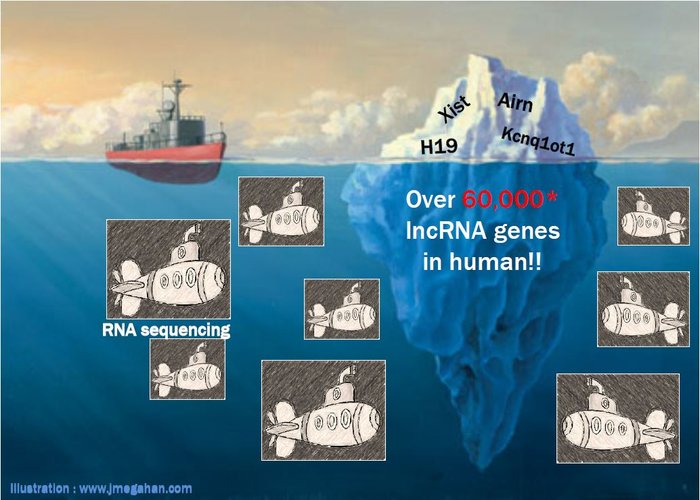What makes us unique: Long non-coding RNAs displays higher expression variation than “classic” genes
Share
Every human expresses a unique set of genes. This is a long known fact for “classic” protein-coding genes, but little was known about long non-coding RNA (lncRNA) genes, that surprisingly outnumber protein-coding genes in the human genome. A new study, performed by CeMM researchers in collaboration with MUW researchers and published in “Genome Biology”, now shows that the expression state of lncRNA genes is more highly variable compared to protein-coding genes, between different individuals. As a result, human individuality can be seen more readily in the altered expression states of lncRNA genes than in proteins made by protein-coding genes.
Until a few years ago, vast tracts of the human genome appeared useless - not containing protein-coding information encrypted in a genetic code and often overloaded with retroviral sequences, they were for a long time disregarded as “junk DNA”. The development of next generation RNA-sequencing (a special technology focus strongly supported at CeMM) changed this dramatically.
Discovery of vast numbers of lncRNA genes in this so-called junk DNA revealed a whole new level of coding and regulatory information in the human genome. Some lncRNA genes are vital for the development of a healthy organism, some play roles in disease and some others are proposed as biomarkers or therapeutic targets. But for the majority their function is unknown. Intriguingly, the human genome in particular, is replete with lncRNA genes and continually new ones are reported.
A new study led by Aleksandra Kornienko, a final-year PhD Student in the working group of Denise Barlow at CeMM, which examined the natural expression variation of lncRNAs in granulocyte blood cells of healthy human donors, has provided a solution to this conundrum. She could show that compared to protein-coding genes, lncRNAs more often change their expression state between different donors. In some volunteers, certain lncRNA genes were not expressed at all or were expressed at a ten times lower rate compared to another donor.
Notably, protein-coding genes rarely showed this extreme level of expression variation between donors - human individuality thus can be seen more readily in the altered expression states of lncRNA genes than in proteins made by protein-coding genes.
However, large donor numbers are required to identify all lncRNA genes in the human genome. Because her study involved many human donors, Aleksandra Kornienko was able to discover 736 new human lncRNA genes expressed in granulocytes. She could also show that the more donors examined the more lncRNA genes would be found – a finding that ultimately suggests that huge donor numbers are needed to discover all lncRNAs expressed in all human tissues.
This study, besides demonstrating a fundamental property of lncRNAs that makes them quite different to protein-coding genes, makes a valuable contribution to the establishment of complete datasets of all human lncRNAs. The high expression variability of lncRNAs, some of which play roles in human diseases, not only influences susceptibilities to those diseases but also affects personalized medical strategies based on lncRNA biomarkers.
Publication:
Aleksandra E. Kornienko, Christoph P. Dotter, Philipp M. Guenzl, Heinz Gisslinger, Bettina Gisslinger, Ciara Cleary, Robert Kralovics, Florian M. Pauler and Denise P. Barlow. Long non-coding RNAs display higher natural expression variation than protein-coding genes in healthy humans, Genome Biology 2016, 17:14, doi:10.1186/s13059-016-0873-8
Funding:
This study was partly funded by the Austrian Science Fund (FWF F43-B09, FWF W1207-B09). PMG is a recipient of a DOC Fellowship of the Austrian Academy of Sciences.

